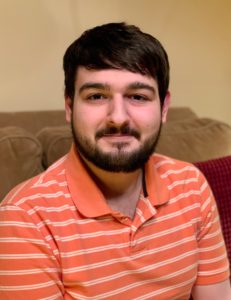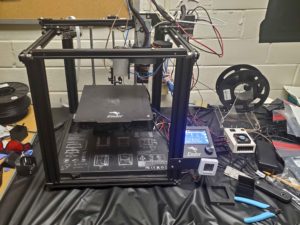NEWS
Nanosystems engineer to continue innovative research with Louisiana Tech
When Brandon Hubbs transferred from Baton Rouge Community College in his hometown to Louisiana Tech University, his plan was to finish his bachelor’s degree and transfer to another university for graduate studies. The three years that he’s spent with Louisiana Tech’s Nanosystems Engineering program have changed his mind. Thanks to engaging coursework and undergraduate research opportunities, Hubbs will continue his studies with the University after he earns his Bachelor of Science this fall.
 Hubbs says joining the Master of Science program feels natural to him since he will have the opportunity to continue working with Dr. Adarsh Radadia, associate professor of chemical engineering, molecular science and nanotechnology, and nanosystems engineering at Louisiana Tech’s Center for Biomedical Engineering and Institute for Micromanufacturing, who helped guide his Senior Projects Conference project and his summer research experience for undergraduates (REU) project. Hubbs and Radadia will work on 3D printer designed parts.
Hubbs says joining the Master of Science program feels natural to him since he will have the opportunity to continue working with Dr. Adarsh Radadia, associate professor of chemical engineering, molecular science and nanotechnology, and nanosystems engineering at Louisiana Tech’s Center for Biomedical Engineering and Institute for Micromanufacturing, who helped guide his Senior Projects Conference project and his summer research experience for undergraduates (REU) project. Hubbs and Radadia will work on 3D printer designed parts.
Hubbs discovered his love for nanosystems engineering as a student at the Baton Rouge Community College. By the time he joined Louisiana Tech’s program, he was prepared to focus on a single major. To his delight, he discovered that the Nanosystems Engineering program is an interdisciplinary degree program that gives students the chance to study a variety of subjects.
“One of the biggest benefits of studying nanosystems at Louisiana Tech is getting experience in so many disciplines. Even though my concentration is in biomedical engineering, I got to take physics courses along with courses in multiple engineering disciplines.”
Hubbs also gained valuable experience with collaboration as well as learning research techniques through Radadia’s lab, where he worked with graduate students and learned more about the graduate program.
“I’m lucky to have Brandon join my team,” Radadia said. “He is special because of his ability to do both computational and experimental work, and he will be working on an exciting research collaboration between Louisiana Tech University and Loughborough University (U.K.).”

Part of Hubbs’s 3D Printer project.
Along with the work with Radaddia, Hubbs says that the hands-on experience he’s gotten through the College of Engineering and Science’s first- and second-year Living with the Lab series and Senior Projects Conference have helped prepare him for graduate school-level research.
“Nano is a marriage between a lot of disciplines, and the project that my team and I worked on for the Senior Projects Conference was a combination of mechanical and electrical engineering, within nanosystems. We worked to improve last year’s team’s wiring and coding for a laser annealing 3D printer, giving us experience working in a system that we didn’t create, which is an important skill in jobs throughout the nanosystems engineering sector.”
“My Freshman Design team included a biomedical engineer and a mechanical engineer. The biomedical engineer was a cook looking for a solution to cooking something at low heat for a long time. That’s something that you can’t necessarily do on a plain stovetop. We developed a way to use a stepper motor to control the temp with our Arduino kit and printed out an opposable for lamps, ran wire through it, and printed the body through kevlar filament that was heat resistant. Our team won the Rolex Award for best design.”
His advice to first-year students, particularly those joining the Nanosystems Engineering program, is to figure out what you want to do in life by exploring what you like to do, and focus all your energy on it. “Find a subject you like, one that you want to study and work with, and stick with it. That advice holds whether you come in as a freshman or a transfer student. Know what you want to do, and choose your major and concentration carefully.”
Recent Comments